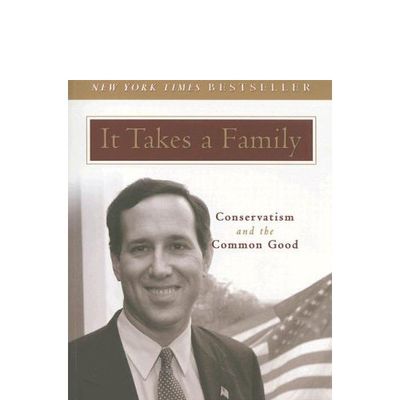
When an ascendant Rick Santorum appeared on ABC’s This Week a couple of days ago, he got a taste of the intense scrutiny which tends to greet newly minted front-runners like himself. During the interview, George Stephanopoulos brought up a controversial passage from Santorum’s 2005 book, It Takes a Family, in which Santorum contends, “The radical feminists succeeded in undermining the traditional family and convincing women that professional accomplishments are the key to happiness.” Santorum insisted to Stephanopoulos that he isn’t saying women shouldn’t work, only that there’s nothing wrong with being a stay-at-home mom, if that’s what they choose. The explanation wasn’t new; Santorum has been asked about that quote many times. What was new was that this time, Santorum added that, oh, by the way, “that section of the book was co-written, if you want to be honest about it, by my wife.”
If that were true, it would certainly help to inoculate Santorum from charges of sexism. But is it true? In an effort to find out, we reached out to Mark Henrie, Santorum’s editor at the Intercollegiate Studies Institute, which published the book. If anyone could confirm Santorum’s claim, we figured, it would be the book’s editor. But Henrie couldn’t say for certain whether Karen Santorum “co-authored” the book’s section on women in the workplace. He did tell us, in an e-mail, that there were several passages he worked on “where I had a hunch Karen played a large role.” But a hunch is hardly a confirmation, and, furthermore, it appears that this is the first Henrie has heard of Karen Santorum’s “co-authorship.”
“The genesis of It Takes A Family was ISI’s work with Karen Santorum on Everyday Graces (ISI Books, 2003),” Henrie wrote in an e-mail, “so it does not at all surprise me that she had a hand in Rick’s book — I know that he had a hand in hers. Rick clearly acknowledges in the preface to ITAF that he had many collaborators in writing his book.”
Indeed, many collaborators are listed in the book’s preface, but Karen Santorum isn’t one of them. Santorum thanks Henrie himself for being an “outstanding editor and counselor,” as well as Jeff Rosenberg for “writing many of the chapter first drafts,” Mark Rodgers for “everything he put into the cultural capital section of the book,” and Mark Ryland for “laying out the framework of this volume.” Karen Santorum receives plenty of praise in the book’s preface, but more for her general support, love, and inspiration:
Karen is so much of who I am and what I do that it is hard to give her enough credit in a book, much less a few lines. She is truly my soul mate. There could be no more loving, faithful, honest, and supportive spouse to have accompanied me through the last fifteen years of campaigns, legislative and home-state crises, and most importantly, parenthood. Our hours are long, the pace intense, and the stress high, but she not only helps hold me together, she is often single-handedly the steady guiding light for our six children, ages 3 to 14, too. Karen’s wisdom and her actions in our own family permeate my discussion of family in this book. She is my refuge, my strength, and my inspiration. And aside from all that, she is a twice-published author, having written and edited Letters to Gabriel and Everyday Graces: A Child’s Book of Good Manners, respectively. (I realize that I married up!)
You also have to wonder why Santorum is only now bringing up his wife’s co-authorship of that controversial passage. When the book initially came out, in 2005, Santorum was constantly on TV defending this very same “radical feminists” quote. But, curiously, he never mentioned that his wife helped to write it, according to a search of Nexis transcripts — not in a July 25 interview on Hannity & Colmes, or in a Today show interview that same morning, or a July 27 interview on Hardball, or a July 28 interview on CNN’s American Morning, or a July 31 interview once with ABC’s This Week (deja vu!), or an August 5 interview with Tucker Carlson on MSNBC.
More recently, Santorum was asked about this very same passage during a May 2011 Fox News presidential debate in South Carolina, and again, he neglected to credit his wife. “All I’m saying is both decisions should be applauded and affirmed, based on the choice the woman wants to make,” Santorum told Brett Baier. “That’s the point I made in the book, and I — and I stand by that choice.”
Obviously, none of this proves that Karen Santorum didn’t “co-author” that passage on the pressures of “radical feminists.” But it does make you wonder.





























